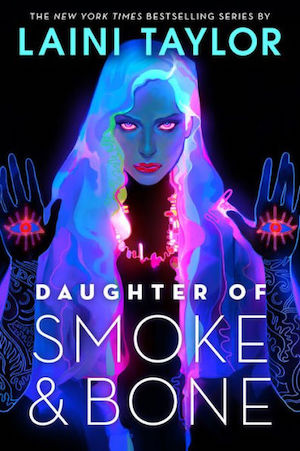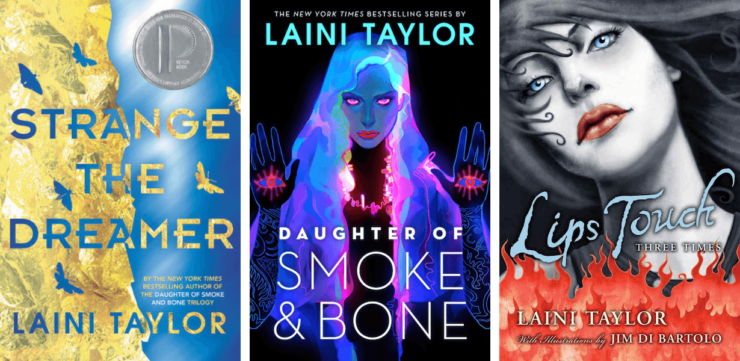I blame Laini Taylor for giving me unrealistic expectations of kissing. Well, okay, maybe my own overactive imagination and hearty diet of fan fiction was more at fault for that. But the way she describes kisses in her incredible works of fantasy never fails to awaken my inner hopeless romantic.
Taylor’s work is a master class in how to intertwine romance with fantasy, particularly her novels Strange the Dreamer and Daughter of Smoke & Bone, along with her collection Lips Touch: Three Times. In these stories, a kiss takes on the same level of magic as any spell—they are fantastical, transcendent, and almost metaphysical experiences for her characters:
Kissing can ruin lives. Lips touch, sometimes teeth clash. New hunger is born with a throb and caution falls away. A cursed girl with lips still moist from her first kiss might feel suddenly wild, like a little monsoon. She might forget her curse just long enough to get careless and let it come true. She might kill everyone she loves.
(From Lips Touch: Three Times)
Romance: It’s More Than Just Rubbing Body Parts Together
Some (though certainly not all) fantasy readers side-eye romance with the same skepticism as the grandson in The Princess Bride, asking with wrinkled noses, “Is this a kissing book?” And in the case of Laini Taylor, the answer is often a resounding “stars, yes.” Platonic relationships, as well as aromantic and asexual representation, are equally important in fiction, but so too is the unabashedly romantic because it’s part of the vastness of the human experience.
However, to say that Taylor’s narratives are only about kissing would be as reductive as saying that The Lord of the Rings is about some dudes going on a long road trip. Her stories explore themes of curiosity, self-discovery, and war, and how our wounds manifest in the ways we hurt others or are hurt by others. In Taylor’s lush, romantic worlds, a kiss can symbolize hope and forgiveness and understanding and self-actualization. It can be a method of healing and a sign of deep human connection, especially between people who are separated by seemingly insurmountable differences.
A kiss is always more than just a kiss.
Balm for the Soul
The starring couple of Daughter of Smoke & Bone hail from opposite sides of a war in which both groups have committed violent atrocities against the other. The question of forgiveness is at the heart of the trilogy—because how can you love someone you should, by all metrics, despise?
Buy the Book


Daughter of Smoke and Bone
In the second installment, Days of Blood & Starlight, the heroine Karou tells the (anti)hero Akiva, “You’re not a monster,” and she kisses “the ink lines on his knuckles as if she could forgive him the lives they represented.” In that tenderness lies the hope for redemption. Her actions reaffirm what she told him when they first met: “War is all we’ve been taught, but there are other ways to live… This is the beginning, here.”
Across the trilogy, the kissing scenes usually aren’t about “true love,” soulmates, or perfection but are instead signs of unconditional acceptance. Karou and Akiva’s relationship embodies what psychologist Robert Sternberg defines as “consummate love” in his triangular theory of love, where passion, intimacy, and commitment form the ultimate fulfilling relationship. The characters share that physical chemistry, emotional bond, and the decision to maintain their love despite all obstacles. Those qualities build the story of love that Karou and Akiva tell each other: the classic Romeo and Juliet narrative, where two factions with irreconcilable differences can nevertheless be bridged with a single, ill-advised kiss between lovers.
A kiss, freely given, signifies hope.
Unknowable Realms, Unopened Doors
When a romance becomes the focus of a fantasy story, it can seem like the characters lose their individuality—but oftentimes the opposite is true. As author Mary McCarthy once wrote in a letter to Hannah Arendt, “What’s the use of falling in love if you both remain inertly as-you-were?” In a well-conveyed fantasy romance, each individual is thrown into harsh relief, the unknown parts of themselves cast under a spotlight, for better or worse. No one in the Laini-verse captures this metamorphosis better than the main couple of Strange the Dreamer.
Lazlo is a librarian trying to uncover the mysteries of the lost city of Weep, while Sarai is a goddess who can visit people in their dreams. It’s through each other—that one-on-one connection—that they truly begin to understand and question the wider world around them. A simple kiss ignites that desire to know more:
When Lazlo had wished to discover, with Sarai, the realm of the unknowable, he had thought of great, huge mysteries like the origin and nature of gods. But right now, he’d have given it all up for this small mystery, this tiny, newest, and best mystery of Weep. This kiss. This exact kiss.
In a typical Laini Taylor novel, the reader pulls back layer after layer to unveil another story hiding beneath the main narrative. The sensation is much like how Taylor describes the moment right before a kiss in Strange the Dreamer: “it’s like . . . finding a book inside another book.” Kisses, much like stories, are ever-unfolding curiosities. Lazlo admits that he only understands the edge of love, of Weep, of gods and goddesses, of the universe beyond his own, and that limitation is represented in a kiss:
And the thing that was almost blinding, unfathomable, was this: Heady as it was—so heady he felt dizzy from it, tipsy—still he sensed that even this was only the threshold to another realm of the unknowable. A door pushed just ajar, and the thinnest sliver of light hinting at radiance beyond.
It is the mind-awakening, heart-opening experience of Sarai’s kiss that propels Lazlo to transform from an observing bystander to a protagonist with purpose. He now understands that Saira’s life is at stake, and instead of asking himself, “What could I do?” he asks, “What will I do?”
A kiss can be a transformative act.
A Pathway to Selfhood
Kissing scenes are as much about selfhood as they are about coupledom. They show how love can enhance and diminish parts of oneself—and reveal secrets previously locked away in the heart’s inner chambers. Therapist and author Esther Perel captures that sentiment: “Love is at once an affirmation and a transcendence of who we are.”
Taylor can certainly wax lyrical on the beauty of a kiss, but the wanting to kiss and be kissed can be more important than the physical act itself. In the short story “Goblin Fruit” from Lips Touch: Three Times, sixteen-year-old Kizzy feels uncomfortable in her own skin and yearns for a grand, romantic life of kissing beautiful boys like Jack Husk (and ignores her grandmother’s warnings about soul-hungry goblins). As she pursues her first kiss, she looks in the mirror and notices “her outer layer had begun to melt away while she wasn’t paying attention, and something—some new skeleton—was emerging from beneath the softness of her accustomed self.
Her yearning to kiss someone awakens an inner understanding, and she envisions the woman she longs to be. It’s in that quest to be kissable that she is able to confidently define herself:
Kizzy wanted to be a woman who would dive off the prow of a sailboat into the sea, who would fall back in a tangle of sheets, laughing, and who could dance a tango, lazily stroke a leopard with her bare foot, freeze an enemy’s blood with her eyes, make promises she couldn’t possibly keep, and then shift the world to keep them. She wanted to write memoirs and autograph them at a tiny bookshop in Rome, with a line of admirers snaking down a pink-lit alley. She wanted to make love on a balcony, ruin someone, trade in esoteric knowledge, watch strangers as coolly as a cat. She wanted to be inscrutable, have a drink named after her, a love song written for her, and a handsome adventurer’s small airplane, champagne-christened Kizzy, which would vanish one day in a windstorm in Arabia so that she would have to mount a rescue operation involving camels, and wear an indigo veil against the stinging sand, just like the nomads.
Kizzy wanted.
Really, she’s longing for selfhood—to fall in love with the person she could become. At the end of the story, rather than being an innocent victim tricked by a goblin, she carves her path and makes her own beautiful mistakes, knowing who she is and what she wants, even when those choices are self-destructive.
A kiss can unveil the deepest parts of one’s identity.
The magic of Laini Taylor’s writing is in how she blends these two genre elements to make romance feel fantastical. Her stories are love letters to the small miracle of lips touching and the transformative power a kiss can hold:
That’s what a kiss is like, he thought, no matter how brief: It’s a tiny, magical story, and a miraculous interruption of the mundane.
(From Strange the Dreamer)
Diane Callahan spends her days shaping stories as a writer and developmental editor. Her YouTube channel, Quotidian Writer, provides practical tips for aspiring authors.










